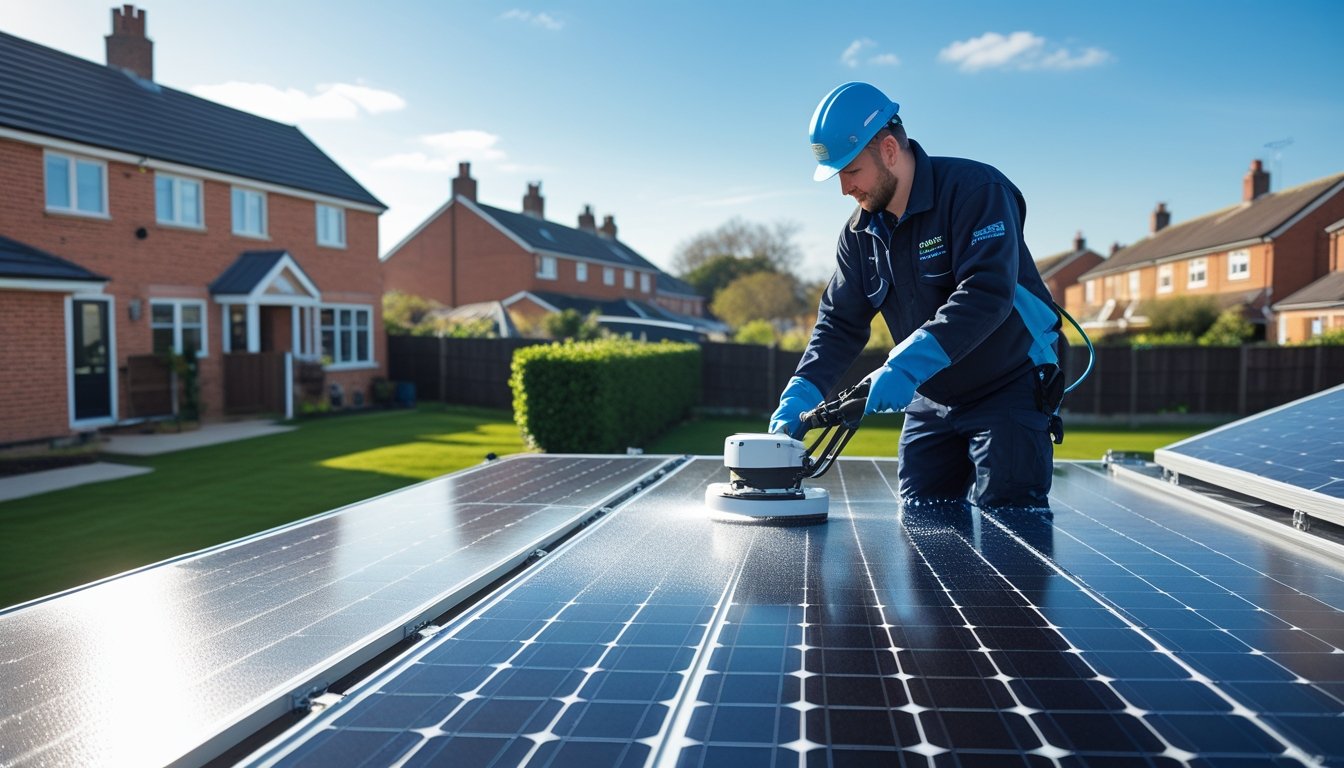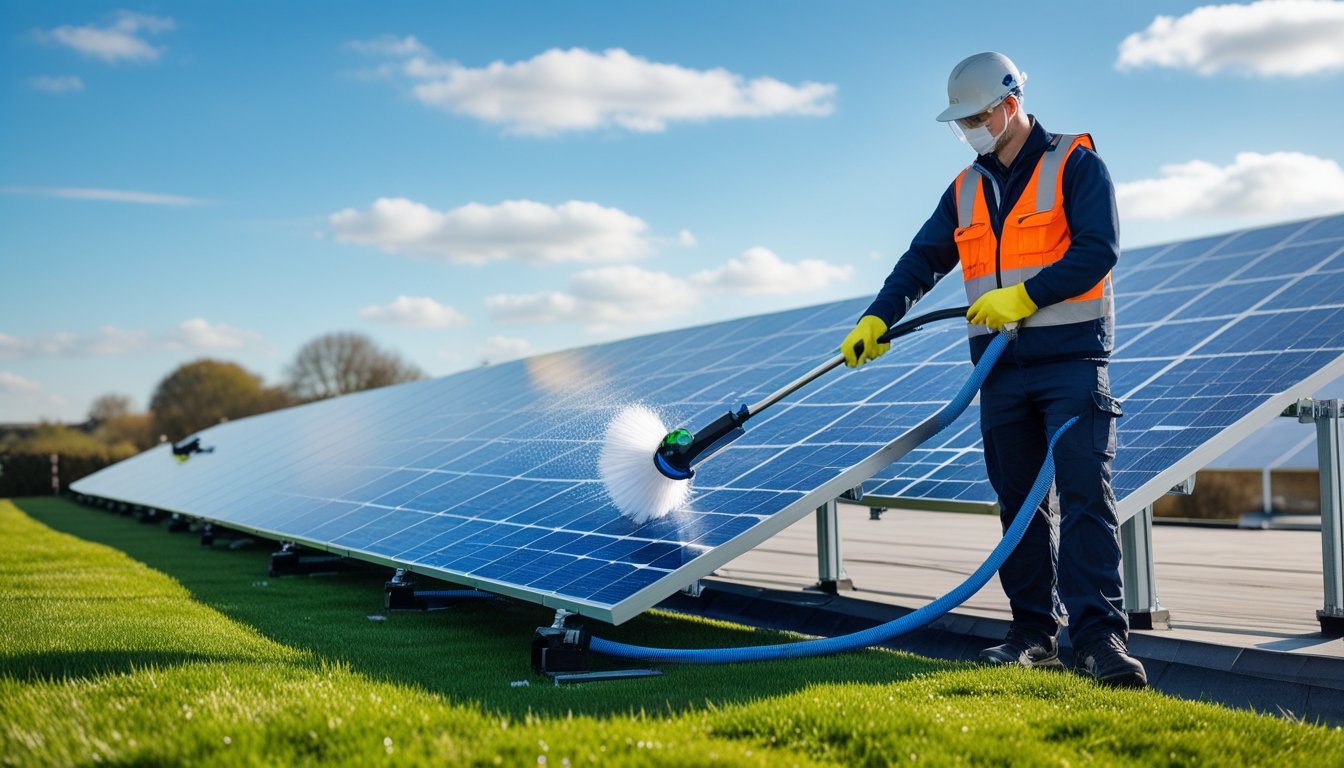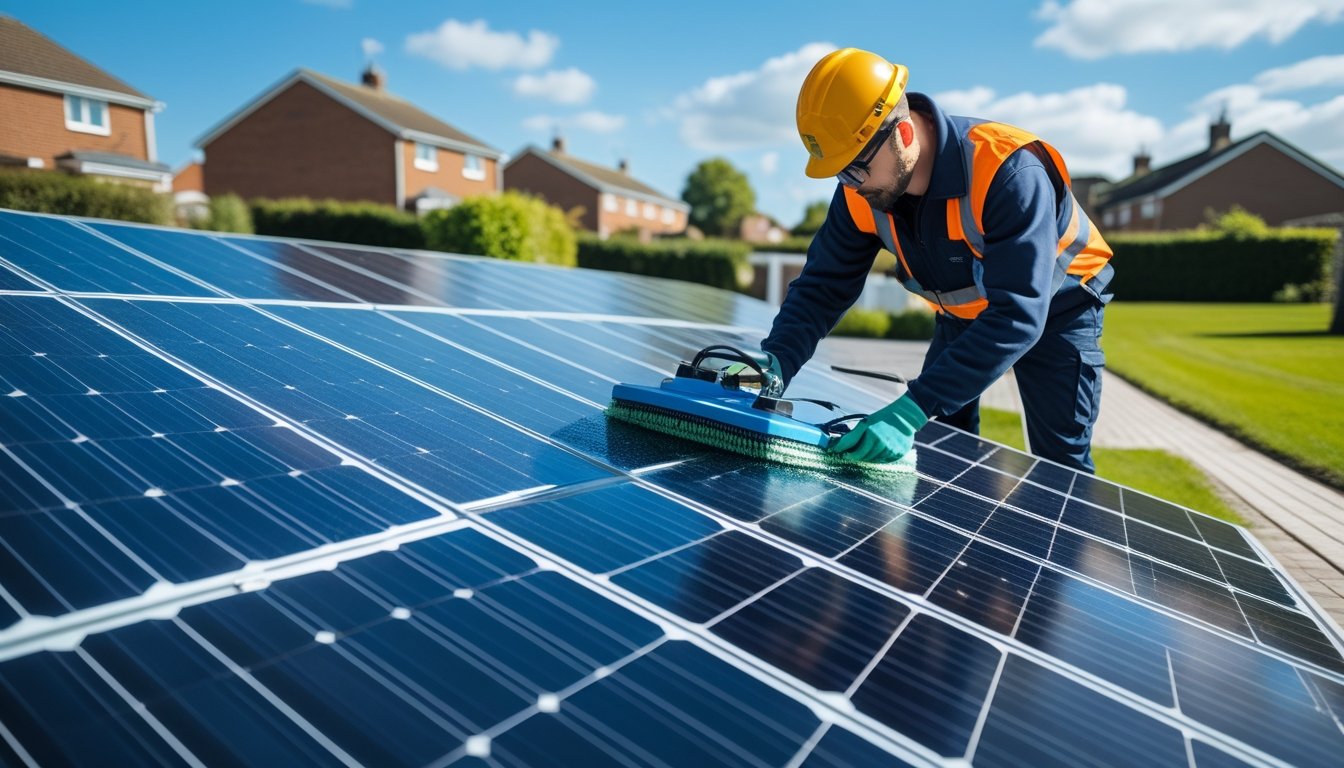Late updated: 29 Aug 2025 15:08
Written by: Eleanor Hartman
Innovative Solar Panel Cleaning Techniques For The UK: Effective Methods Explained
As the use of solar panels continues to grow in the UK, the need for efficient maintenance practices becomes ever more critical. Keeping solar panels clean is essential for maximising their efficiency and prolonging their lifespan. This necessity has spurred the development of innovative cleaning techniques specifically tailored for the unique weather conditions and environmental factors found across the UK.

Traditional methods might seem straightforward, yet they often fall short in effectiveness and cost-efficiency. Recent advancements have led to safer and more efficient approaches that reduce water usage and minimise the risk of damage to solar equipment. These breakthroughs not only promote sustainability but also improve the return on investment for solar panel owners.
It is important to explore these innovations to find the best options for maintaining solar installations. From waterless cleaning solutions to advanced robotic systems, the landscape of solar panel maintenance is changing rapidly. As we delve into these modern methods, we'll uncover which options provide the greatest benefits for homeowners and businesses alike.
Key Takeaways
- Effective cleaning boosts solar panel efficiency.
- Innovative solutions offer cost-effective maintenance.
- Advanced methods improve longevity and performance.
Essential Solar Panel Cleaning Methods for the UK
Maintaining and enhancing the efficiency of solar panels requires using effective and appropriate cleaning methods. In this section, we will explore the advantages of professional water systems, tools for manual cleaning, and the latest robotic innovations.
Professional Pure Water and Deionized Water Systems
Pure water and deionized water systems are popular in professional solar panel cleaning. These systems effectively remove dirt, grime, and minerals without leaving residues. Deionized water is free from ions and minerals, ensuring that panels are spotless after cleaning.
Using these methods reduces the risk of potential damage. As they use no harsh chemicals, the surrounding environment and vegetation are preserved. In the UK, several service providers offer mobile cleaning units equipped with these systems, making it a convenient and eco-friendly option for maintaining solar panel efficiency.
Manual DIY Cleaning Tools and Techniques
For those who prefer a hands-on approach, manual cleaning remains a viable option. Essential tools include a soft-bristle brush, squeegee, and telescopic pole for easy reach. Using a non-abrasive sponge can help remove stubborn dirt without scratching the panels.
The UK climate often brings rain, but dust and bird droppings can still accumulate. Regular manual cleaning helps maintain efficiency by ensuring no debris obstructs sunlight. DIY enthusiasts might choose eco-friendly cleaning solutions, or simply use water, to protect the panel surface and the environment.
Robotic and Autonomous Cleaning Innovations
Robotic cleaning innovations have started transforming how we maintain solar panels. These advanced systems are designed to operate autonomously, reducing labour costs while ensuring regular upkeep. They glide across the panels, using soft brushes or air blowers to remove debris.
Given the UK's unpredictable weather, these robots are particularly advantageous. They clean efficiently without the need for detergents or harsh chemicals, minimising ecological impact. As technology improves, we anticipate these devices becoming more affordable, making them a practical choice for larger installations and solar farms across the UK.
Waterless and Advanced Cleaning Solutions

In our exploration of solar panel maintenance, prioritising eco-friendly and efficient methods is essential. Waterless robotic cleaning and environmentally friendly techniques are paving the way for innovative solutions, particularly in regions like the UK where sustainability is high on the agenda.
Waterless Robotic Cleaning Technologies
Waterless robotic cleaning has emerged as a significant innovation in maintaining solar panel efficiency. By using advanced robotics, these systems eliminate the need for water, a crucial advantage in areas facing water scarcity.
Robots equipped with soft, rotating brushes or air jets are deployed to clean solar panels. These machines are designed to navigate solar installations independently, ensuring each panel is cleaned thoroughly without human intervention. The precision and efficiency offered by these robots make them a valuable tool in large solar farms where manual cleaning can be impractical or costly.
Furthermore, the integration of AI-driven predictive scheduling optimises cleaning cycles, ensuring panels are cleaned at optimal times for maximum energy output. This automated approach minimises downtime, contributing to both cost-effective and efficient maintenance solutions.
Environmentally Friendly Cleaning Methods
Environmentally friendly cleaning methods often employ sustainable materials and innovative techniques to maintain solar panels without harming the environment. Options such as compressed air or electrostatic technology provide water-free alternatives that are both efficient and resource-conserving.
Microfiber cloths combined with electrostatic charges can effectively remove dust and dirt. These methods reduce water consumption significantly and are suitable for smaller installations or residential systems where large-scale robotic solutions may not be feasible.
Incorporating eco-friendly cleaning solutions aligns with broader sustainability goals, reducing the environmental impact while ensuring solar panels operate at their peak efficiency. By choosing these methods, we not only maintain clean energy systems but also contribute positively to environmental conservation.
Frequently Asked Questions

In our exploration of solar panel cleaning techniques within the UK, we've noticed a variety of common inquiries regarding tools, methods, and services that ensure optimal performance and longevity of solar panels. Let's address some of these pertinent questions.
What are the best tools for cleaning rooftop solar panels?
For cleaning rooftop solar panels, we recommend using soft brushes, squeegees with plastic blades, or microfibre cloths. These tools help remove dirt effectively without scratching the glass surface of the panels.
Can solar panels be cleaned automatically, and if so, how?
Yes, automatic cleaning systems like robotic cleaners are available. These systems are specifically designed to clean panels without manual intervention, using brushes and jets of water to keep the surface clear of debris.
Which solutions are recommended for cleaning solar panels without damaging them?
We suggest using biodegradable cleaning solutions or a simple mix of water and isopropyl alcohol. Avoid harsh chemicals and detergents that could harm the panel's surface or frame over time.
What are the methods for cleaning solar panels in the absence of water?
Dry cleaning methods include using brushes or air blasters to remove loose debris. These techniques are particularly useful in areas with water scarcity, ensuring panels remain clean without the need for water.
How often should solar panels be cleaned to maintain optimal efficiency?
Cleaning frequency depends on environmental conditions, but generally, twice a year is ideal. In areas prone to heavy dust or bird activity, more frequent cleaning might be necessary to maintain efficiency.
What professional services are available for solar panel cleaning?
Professional cleaning services offer comprehensive maintenance packages. These services typically include inspection, cleaning by trained personnel using safe practices and equipment, and efficiency checks to ensure your system remains in peak condition.